How to Order Chinese Food in an Authentic Chinese Restaurant: 40+ Chinese Words and Phrases (Plus Eating Etiquette)
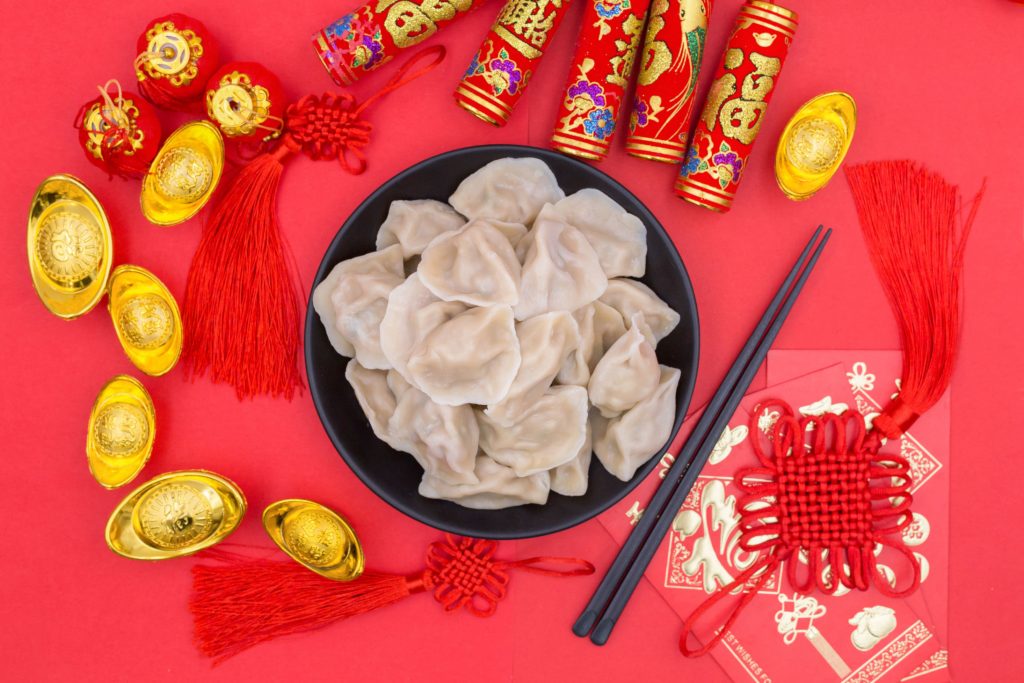
If you’ve ever been to a Chinese restaurant, you might think it’s super easy to order. Everything on the menu is in English, there are usually even pictures in the menu list. You just arrive, order, eat, drink and go.
If this is the case, then you probably haven’t been to a real Chinese restaurant. The rules in these restaurants are something else.
And there is no pinyin. No English. Just characters. (You can read this if Chinese characters scare you.)
Before you panic and decide to never go to a Chinese restaurant (with Chinese friends), have a look at the most common phrases and items on a Chinese menu.
Even if you don’t have a chance to go to China, I’m sure wherever you live, you can practice your new skills in a Chinese restaurant. Get inspired on how to do it here.
And while you’re at it, remember these simple rules to avoid embarrassing yourself or offending anyone while you’re having a proper Chinese dinner.

Chinese Phrases to Book a Table in a Real Chinese Restaurant
Booking a table in a Chinese restaurant is probably one of the easiest parts. Make sure you know all these phrases before you call or visit a restaurant to reserve a spot:
- 我想订一张五人桌 (wǒ xiǎng dìng yī zhāng wǔ rén zhuō) – “I would like to book a table for five people.” Literal meaning: “I would like to book one five people(’s) table.”
- 有什么特殊的场合吗?(yǒu shé me tèshū de chǎnghé ma?) – “Are you celebrating a special occasion?” Literal meaning: “What special occasion do you have?”
- 我朋友的生日 (wǒ péngyǒu de shēngrì) – “My friend’s birthday.”
- 您想几点预定桌?(nín xiǎng jǐ diǎn yùdìng zhuō?) – “What time would you like to book your table for?” Note: 您 (nín) is used as a polite way to say “you”; usually if you don’t know the person that well, they’re older and you want to show them respect. In Chinese, 你 (nǐ) is much more common, as an informal way to say “you”.
- 我想订六点钟的桌 (wǒ xiǎng dìng liù diǎn zhōng de zhuō) – “I would like to book a table for six o’clock.” Literal meaning: “I would like a six o’clock(’s) table.”
- 好的,这一切都为您预订 (hǎo de, zhè yīqiè dōu wèi nín yùdìng) – “Okay, that’s all booked for you.”
- 谢谢 (xièxiè) – “Thank you.”
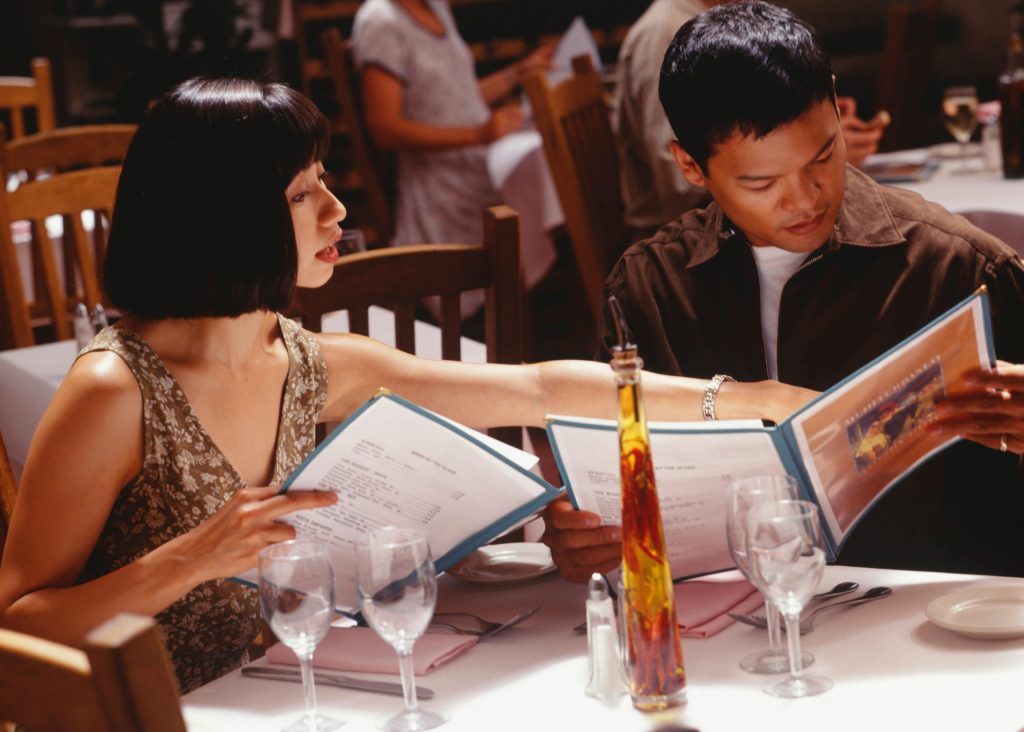
Browsing the Menu in a Chinese Restaurant — The Most Common Chinese Dishes
Although we all have some experience with Chinese cuisine, if you’re only used to Western bistros, you might be unpleasantly surprised how different the real Chinese food is.
Less meat, less oil, more vegetables. In general, the diet is much healthier, portions are smaller and the taste is also different.
Here are some Chinese foods and dishes you’re most likely to see when you browse a Chinese restaurant’s menu:
- 水饺 (shuǐjiǎo) or 饺子 (jiǎozi) – “chinese dumplings”. Both mean the same thing with only a small difference: 水饺 is boiled, while 饺子 usually refers to steamed. You’re more likely to see 饺子.
- 春卷 (chūnjuǎn) – “spring rolls”. Chinese spring rolls are very similar to the ones we know in Western world. With either vegetables or meat filling, they’re fried and crispy.
- 火锅 (huǒguō) – “hotpot”. One of the most popular Chinese dishes. The base is usually a meat broth with multiple different ingredients, such as meat, seafood, vegetables and dumplings.
- 北京烤鸭 (Běijīng kǎoyā) – “Peking duck”. This dish is so popular, some consider it a Chinese national dish. Peking duck has a strong distinct flavor and smell and is often eaten with sweet bean sauce or soy sauce.
- 宫保鸡丁 (gōngbào jīdīng) – “kung pao chicken”. The Chinese kung pao is a bit different to the Western one. Instead of a thick, cornstarch texture, the Chinese kung pao is usually just stir fried with soy sauce, garlic, nuts and ginger or honey.
- 麻婆豆腐 (mápó dòufǔ) – “ma po tofu”. A spicy, flavorful dish. Tofu is sprinkled with beef or pork and green onions.
- 炒面 (chǎomiàn) – “chow mein”. Chow mein are fried noodles. There are varieties with different meats, vegetables or seafood.
汤面 (tāngmiàn*) – “noodle soup”. Chinese noodle soup is a bit different to the one we have in mind when we say “chicken noodle soup” or “chicken broth”. Apart from a different taste, Chinese noodle soup is much thicker, with a lot of vegetables, meat and, of course, noodles.
Although there is so much food Chinese restaurants offer, recognizing and knowing these foods and ingredients in Chinese is essential:
猪肉 (zhūròu) – “pork”
*牛肉 (niúròu) – “beef”
*鸭肉 (yāròu) – “duck”
*鸡肉 (jīròu) – “chicken”
*豆腐 (dòufu) – “tofu”
*虾肉 (xiāròu) – “shrimp”
*米饭 (mǐfàn) – “rice”
*炒饭 (chǎofàn) – “fried rice”
*米粉 (mǐfěn) – “rice noodles”
*面条 (miàntiáo) – “flour noodles”
*蔬菜 (shūcài) – “vegetables”
*白菜 (báicài) – “Chinese cabbage”
*酱油 (jiàngyóu) – “soy sauce”
*大蒜 (dàsuàn) – “garlic”
*花生 (huāshēng*) – “peanuts”

Ordering Food in a Real Chinese Restaurant — Remember to Share Your Food!
The tradition in China is to share food. When you go to eat at a Chinese restaurant with multiple people, know that you’re all ordering for everyone.
Keep these expressions handy for when you are ready to order:
- 请给我刀叉 (qǐng gěi wǒ dāo chā) – “Can I please have a fork and knife?” Literal meaning: “Please, give me cutlery.” In Western Chinese restaurants, or even in bigger, more touristy restaurants in China, cutlery will be available. But keep in mind, a lot of times you’re going to have to use only chopsticks to eat.
- 有筷子吗?(yǒu kuài zi ma?) – “Do you have chopsticks?”
- 有勺子吗?(yǒu shǎo zi ma?) – “Do you have spoons?”
- 我不能吃… (wǒ bù néng chī…) – “I can’t eat…” You can use this phrase when you have allergies or don’t want an ingredient in your food.
- 请给我们菜单(qǐng gěi wǒmen càidān) – “Can we please have a menu?”
- 请给我们三碗米饭 (qǐng gěi wǒmen sān wǎn mǐfàn) – “Can we please have three bowls of rice?”
- 请给我们六杯水 (qǐng gěi wǒmen liù bēi shuǐ) – “Can we please have six glasses of water?”
When ordering and eating with Chinese people, always wait for the eldest one, or the one whose celebration it is, to order and start eating first. Nowadays, it doesn’t matter as much with young people, but older Chinese people might get offended, if you don’t respect this etiquette.
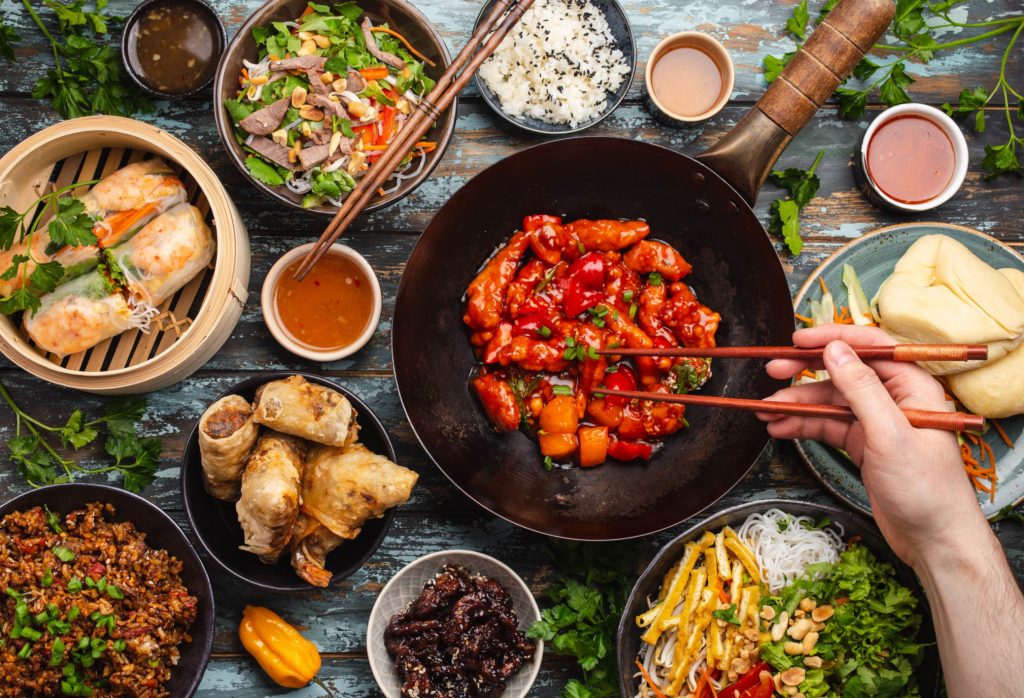
Eating Etiquette — Slurp and Don't Eat it All
When eating Chinese food, you might be surprised at the apparent rude behaviour you see around you. But is it really rude?
In the Western world, we are taught to eat quietly, neatly and to eat everything we have on our plate, otherwise, it’d look like we didn’t enjoy the food.
But in China? Unless you don’t slurp, you are not enjoying your meal at all! Loud tongue clicking and slurping is a sign of being happy with your food. And eating everything that’s on the table? That’s quite rude in Chinese culture, too.
Although your grandma would always make you practically lick your plate clean to make sure you didn’t leave her house hungry, or in a restaurant you’re used to the waiter offering you a box to take your leftovers home, in Chinese restaurants, the situation is different.
To show the chef and your co-eaters you enjoyed your meal and you’re now full, you are always expected to leave at least a little bit on your plate.
So next time, leave your manners at home, and be loud.
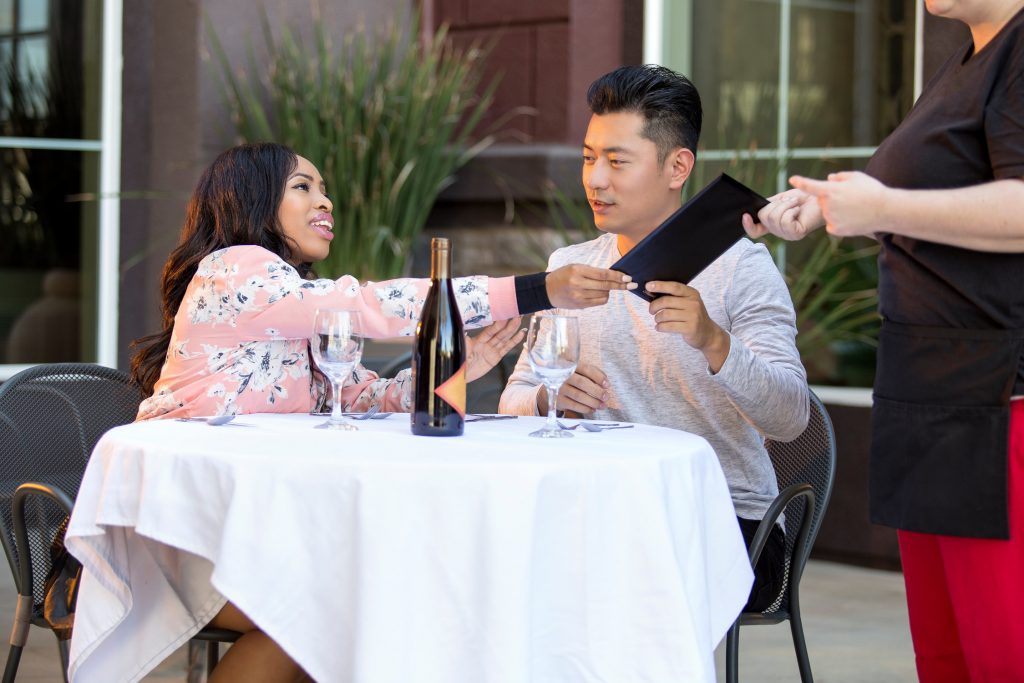
Paying in a Chinese Restaurant — Fight for the Bill
Fighting for the bill is common in a lot of countries.
Sometimes you want to treat someone, sometimes you don’t actually want to pay, but it’s polite to offer.
We all have friends who say: “Today I pay, next time you will.” And we don’t want to cause a scene or attract attention, so we agree.
But in a Chinese restaurant? No, no, no way you agree to this.
You have to fight hard.
Chinese fights for the bill last long and sometimes, they even end up being physical.
All of this, of course, only applies when you go eat with your friends or close acquaintances.
Otherwise, with older people or with business partners, it’s not appropriate even in a Chinese restaurant to fight physically or offer to pay more than twice or three times.
In China, men usually pay for women on a date and older people pay for younger people.
Also, if somebody invites you for a meal to celebrate their birthday or other event, you are not expected to fight hard for the bill either.
Eating with young people means they are also more likely to be willing to split the bill as well.
Here are a couple of phrases to remember when you’re ready to pay, fight for the bill and thank someone else for paying:
- 服务员(fú wù yuán) – “waiter”. Although Western people might find it rude, it’s completely normal and expected in a Chinese restaurant for you to shout at a waiter and just say “waiter”.
- 请给我帐单 (qǐng gěi wǒ zhàng dān) – “Can I have a bill please?”
- 用卡可以吗?(yòng kǎ kěyǐ ma?) – “Can I pay by card?”
- 我今天要付款 (wǒ jīntiān yào fùkuǎn) – “I’m going to pay today.”
- 下次可以付款 (xià cì kěyǐ fùkuǎn) – “You can pay next time.”
- 多谢你,你太客气了(duōxiè nǐ, nǐ tài kèqìle) – “Thank you so much, you’re too kind.”
- 下次一定让我来 (xià cì yīdìng ràng wǒ lái) – “You have to let me pay next time.”
Literal meaning: “Next time, for sure let me come/let me do it.”
In China, it’s not a common practice to tip and there also shouldn’t be any service fee added to your bill. If you still want to tip, you can do it, but expect another little fight.
- 小费 (xiǎofèi) – “tip”. Literal meaning: “small fee”.
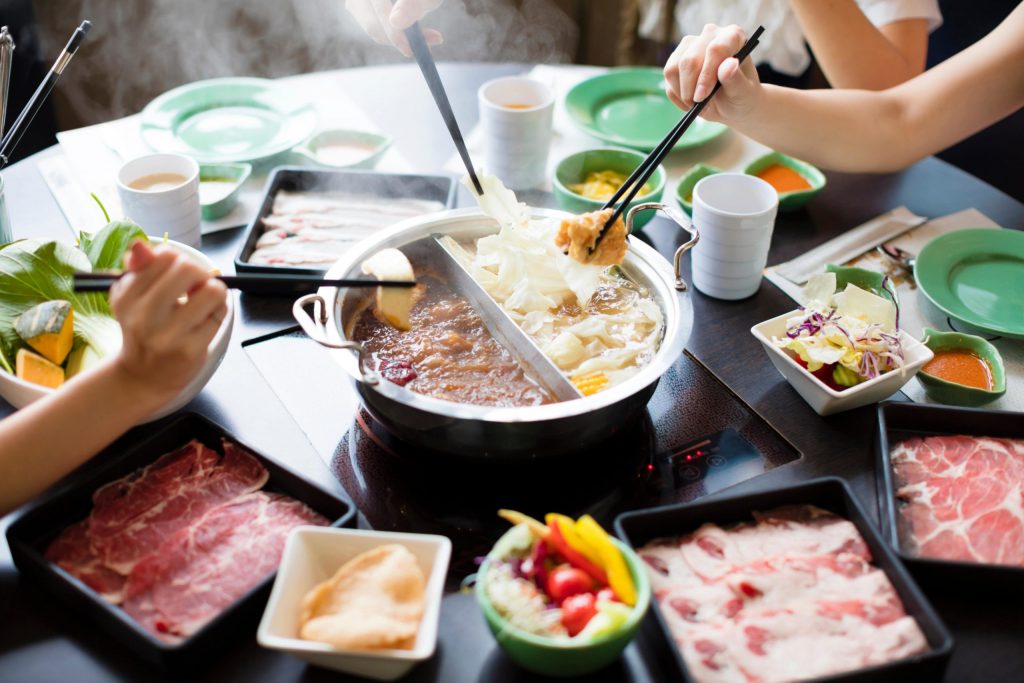
Ready for a Chinese Restaurant?
It might seem like a lot — learning all the characters and Chinese foods, remembering etiquette and maybe using chopsticks the whole time, too. The fear of getting embarrassed or offending someone.
But here’s the thing — Chinese culture might be different to Western one, but Chinese people are incredibly nice and welcoming. Even if you don’t strictly follow their rules, it’s easy to observe from them and they would hardly ever judge you.
Nowadays, it is even easier. Young Chinese people love Western culture and they’re getting used to fast food, cutlery, splitting the bill, and everything we know.
Don’t be afraid to ask and admit you’re not sure about something — they will love to help you!

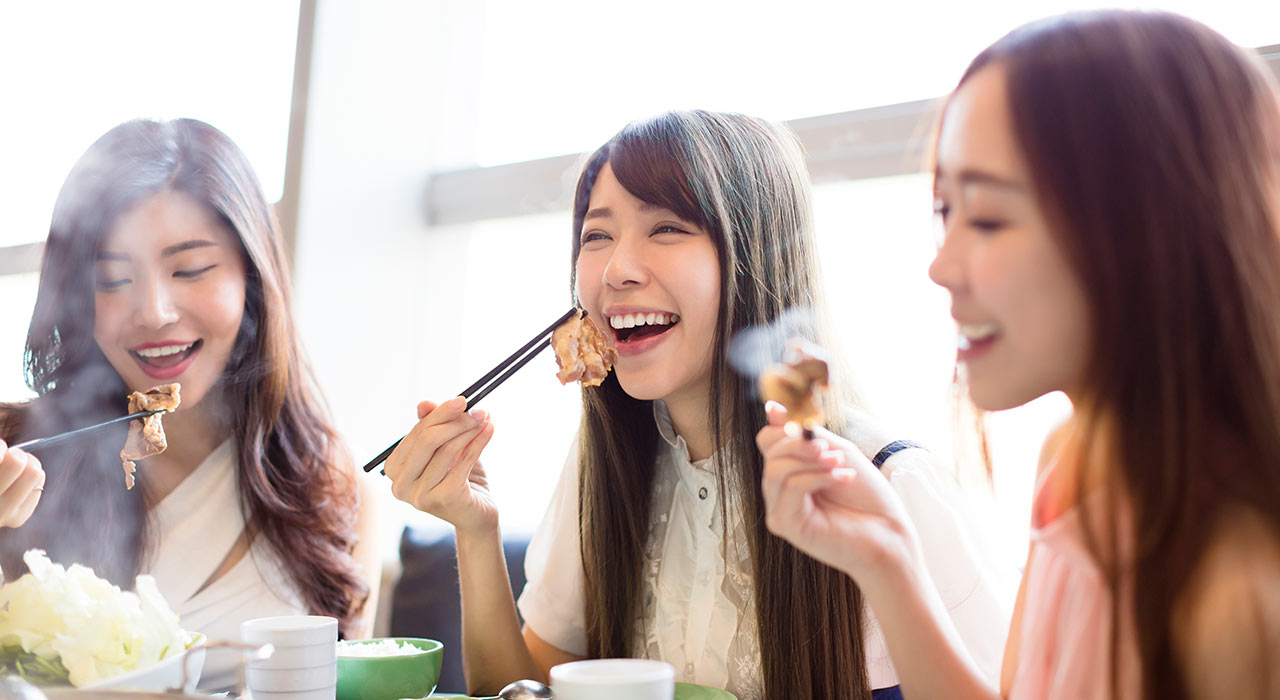

Social